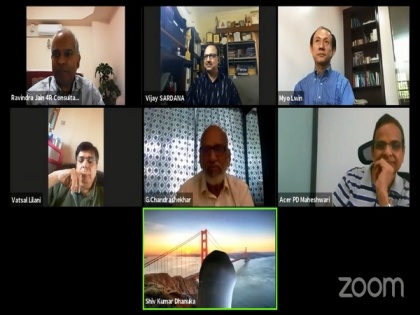Experts from India and Myanmar discuss ways to strengthen pulses trade
By ANI | Published: October 27, 2020 10:10 PM2020-10-27T22:10:10+5:302020-10-27T22:20:03+5:30
Myanmar experts on pulses trade have suggested that India should declare in October of every year the quantity of pulses they plan to import the following year.

Experts from India and Myanmar discuss ways to strengthen pulses trade
Myanmar experts on pulses trade have suggested that India should declare in October of every year the quantity of pulses they plan to import the following year.
The suggestion was given on Monday during a webinar to further India-Myanmar relations through pulses trade.
India had introduced quantitative restrictions (QR) in August 2017, causing much disruption to the pulses trade that had been functioning smoothly since 1988.
Dr Myo Lwin felt that if the restrictions cannot be done away with, then the Indian authorities should declare in October of every year the quantity they plan to import the following year so that Myanmar farmers can sow accordingly.
Commodities specialist G Chandrashekar felt that the QR system was here to stay and had a purpose to serve. He suggested that Myanmar needed to make a case to the Indian government for a long-term partnership wherein it could grow a certain volume and in return buy back commodities like sugar to bridge the big trade deficit, which stood in its favour.
Vijay Sardana, a Delhi High Court advocate, opined that it was only reasonable to expect every government to do what's best in the interests of its people.
"The Indian requirement for pulses shall grow from 24 million tonnes (MT) to 40 million MT by 2040 and given the reduction in planting areas and depleting water table in India, the government shall need to cover its protein security through international partnerships that pass the scrutiny of various domestic stakeholder," he said.
Sardana felt that the relationship should be long-term and structured keeping the Indian sensitivities in mind rather than being transactional.
Vatsal Lil, President of Overseas Agro Traders Association, highlighted the disruption caused by the short arrival window of just 35 days, recently given for the import of 400,000 MT toor whole. He felt that licences issued in June should ideally be valid till March 31 the following year so that buyers don't have to buy in a rush and pay more for services such as freight.
He also felt that total volumes imported during the Open General License regime were almost the same as now under the QR system, so perhaps there was a need to go back to the blackboard and review the QR.
Both the Indian panellists also felt the three new farm laws were path-breaking reforms and extremely positive for the Indian farmers.
The panellists also felt that Myanmar could perhaps look at planting oilseeds commercially as India imported almost 70 per cent of its need and had a long way to go before it turned self-sufficient. It would guarantee Myanmar farmers an alternative for the foreseeable future and add a dimension to the trade relationship.
( With inputs from ANI )
Disclaimer: This post has been auto-published from an agency feed without any modifications to the text and has not been reviewed by an editor
Open in app